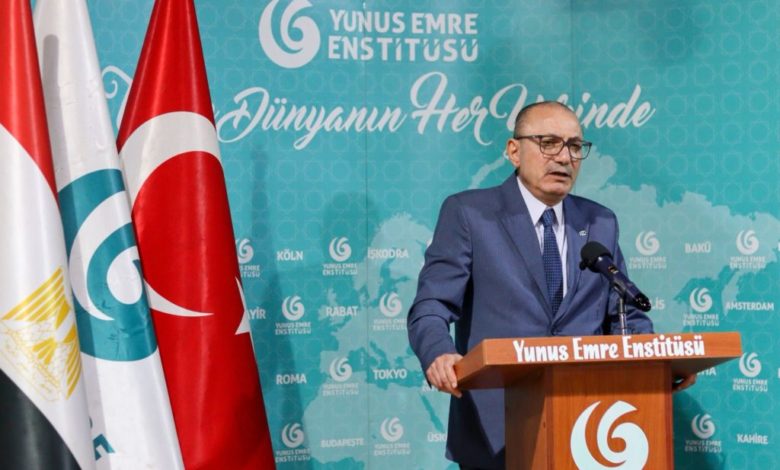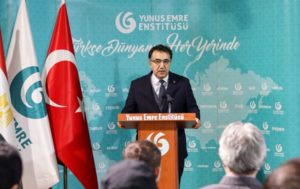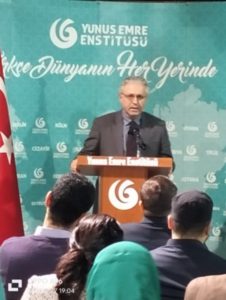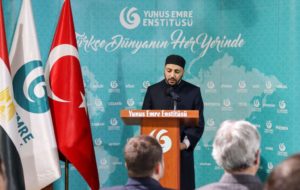
Ashraf AboArafe
In the presence of Ambassador Salih Mutlu Şen, Turkish Ambassador to Egypt, the Turkish Yunus Emre Cultural Center commemorated this evening the eighty-seventh anniversary of the poet of independence or the poet of Islam, as the Arabs like to call him, Muhammad Akif Ersoy at the institute’s headquarters in Dokki, Cairo.
The Turkish ambassador to Cairo, Salih Mutlu Şen, said, “Egypt was and still is a favorite destination for the Turks, as is the case with the Egyptians for Turkey. In the early twentieth century, many families used to travel to Egypt in the summer for the purpose of tourism, and some of them preferred to reside in Egypt for various reasons, and this What prompted the nationalist poet, Muhammad Akef Arsoy, to come to Egypt and reside in its capital, Cairo.
Mutlu Shen added, “We will never forget the virtue of Egypt, which hosted our national poet, Muhammad Akif Arsoy, and embraced him under the patronage of Abbas Halim Pasha.”
This came during an event held by the Yunus Emre Institute in Cairo (the Turkish Cultural Center), yesterday evening, Wednesday, on the eighty-seventh anniversary of the death of the Turkish poet and author of the Independence Anthem (the Turkish national anthem), Mehmet Akif Ersoy. 
For his part, the director of the Yunus Emre Institute in Cairo, Amin Poyraz, confirmed in a speech he delivered during the event that “Akef lived many years of his life in Egypt and considered it his second country. He also taught the Turkish language at the Egyptian University (currently Cairo University), which adds importance.” Especially for our event here today.”
Also, Dr. Ibrahim Aslan, the educational advisor, gave a speech in which he praised the literary wealth of the poet Muhammad Akif Arsoy… the poet of independence or the poet of Islam, as the Arabs like to call him.
The event included playing the Turkish and Egyptian national anthems, mourning the souls of the martyrs, praying for them, and reciting verses from the Holy Quran. This was followed by a presentation by the Educational Advisor at the Turkish Embassy, Prof. Dr. Ibrahim Aslan, in which he talked about the poet Muhammad Akef, his intellectual and literary personality, and his most important poems and poems. A selection of poems by the Turkish poet was recited by the institute’s students.
On December 27 of each year, various events are held in Turkey and its representations abroad, to commemorate the death of the nationalist poet “Mehmet Akif Ersoy,” who with his poetry renewed hope in the souls of the Turkish people and inflamed their patriotic feelings during the War of Independence that began after the defeat of the Ottoman Empire in the World War. The first.
Biography!
“Lord, do not force this people to write a national anthem again.” This is the only wish of Muhammad Akif Ersoy, the poet of Turkish independence, or the poet of Islam, as Arab writers like to call him.
These days, Turkey is celebrating the centenary of the national anthem, as Turkish President Recep Tayyip Erdogan issued earlier this month a circular approving the year 2021 as “the year of Muhammad Akif and the National Anthem of Independence,” with the aim of drawing attention to the poet’s contribution to Turkish history, announcing the provision of all kinds of support. To organize events and activities throughout the year within the scope of celebrations by all public institutions and organizations.
The story of the national anthem
Erdogan said that the country’s national anthem has become a source of inspiration for the nation and for all the oppressed in their struggle for freedom, adding that “the national anthem is the common value and denominator for 84 million citizens, including Turks, Kurds, Circassians, Arabs, Alawites, Sunnis, and Laz.”
In its darkest circumstances in March 1921, the “Grand National Council” approved Muhammad Akef’s poem as the “Independence Anthem,” so that the poem was sung everywhere with the intention of raising the morale of the Turks in the battles against the occupiers, and it began with:
Do not be afraid, the red flag will not fade in the twilight of the sky
Before the flame of light goes out in the last house on my homeland
It is a planet that will continue to shine. It is the glue for my nation
It is mine and my people without end
The idea of writing the national anthem appeared about a year after the establishment of Parliament on April 23, 1920, and the Turkish people’s declaration of sovereignty over the land that became known as Turkey.
Literary and academic studies, especially after he joined Istanbul University in 1908 as a professor of Ottoman literature, and his participation in publishing the magazine “Sirat Mustaqim”, in which he published most of the poems of his first collection of poems, “Pages”, published in 1911.
The young man Akef showed interest in the writings of Sheikh Muhammad Abduh, for whom he translated “Islam between Science and Civilization” (1901), in response to the then French Foreign Minister Gabriel Hannot, who attributed the reasons for the backwardness of Muslims to Islam itself. He also translated into Turkish the book “Embracing Islam.”
Ersoy became one of the most famous figures in Turkish literature in the early twentieth century, and his poems dealt with social problems and philosophical, religious, political and moral issues. It appeared in 7 poetry collections, and his poetic talents emerged during World War I. He inflamed the feelings of the Turks with poems in which he called for Islamic unity, including the poem “The Stages” (1911), “A Lecture in Sulaymaniyah” (1912), and “Aswat Alhak/Voices of Truth” (1913). “Lecture on Fatih” (1914), “Memories” (1917), “Asim” (1924), and “Althilal/shados” (1933).




